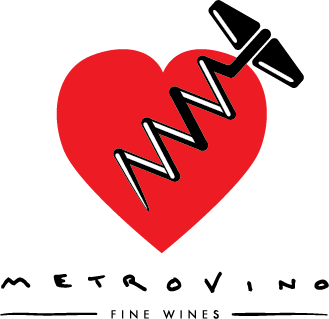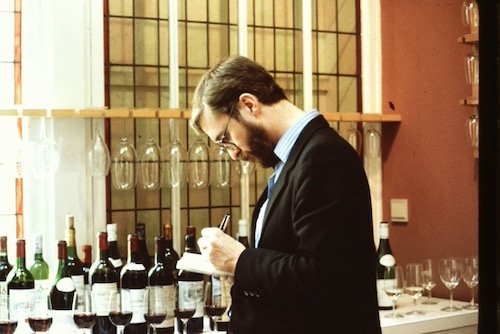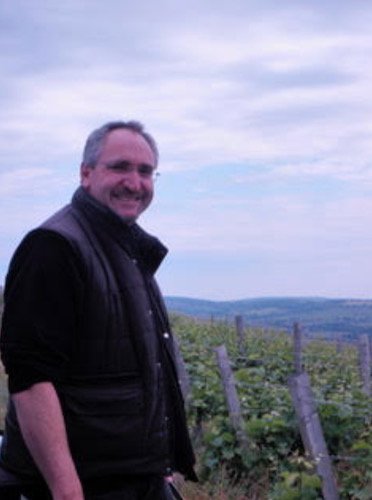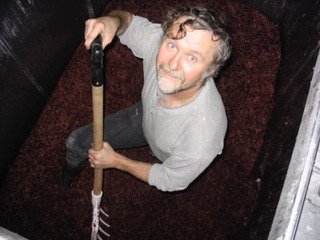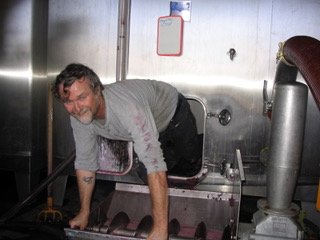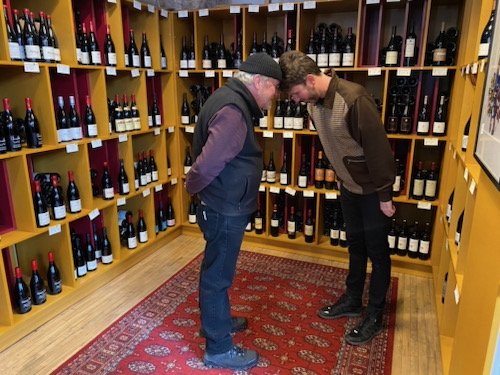The Richard Harvey Interview
Richard Harvey is a living, indefatigable legend of the Western Canadian wine scene. Particularly in Calgary, there’s nobody doing good work with wine that hasn’t been positively influenced by Richard, even if they’ve never met him and aren’t aware of this influence. Across the decades and through his work as a sommelier, importer, retailer and educator, his infectious and fearsome passion for wine has taken Alberta out of the vinous dark ages. Speaking for all the Metro Mates, countless alumni and innumerable customers, we shudder to think of what we might be drinking and doing if it wasn’t for Richard’s life’s work and perpetual generosity.
Metrovino 1996
In 1996, you remortgaged your home to open a wine shop in a back alley. This question isn’t meant to be taken pejoratively as we’re all indebted to you for doing so—but just what the hell were you thinking?
Thinking? I started to think for real only when the “project” was already rolling, when it was too late. That’s when the most intense fear I have ever experienced in my life was a companion to each second of every day. A fear of failing for sure, as well as the loss of the first house that I, my parents or grandparents ever owned, only left me the option of making it work! Absolute sphincter-tightening, madness-inducing FEAR!
You were born in Western Canada to British immigrants who didn’t count wine as part of their daily routine. How did you eventually find your way to wine?
My Yorkshire-born parents were working as domestic servants (butler, cook) and in search of work, we moved from Victoria B.C. to the USA—first to Washington State, then to Sonoma Valley, California.
In California, along with the ritual roast beef & Yorkshire pudding on Sundays, my dad would pop a bottle of something like Sebastiani Zinfandel (“Unique Bramble Taste!” proclaimed the label) and he’d pour a wee bit for my brother and I, though dad was a more beer & whisky guy. (Mum really didn’t like wine, although once she imbibed a sip of Moscato d’Asti, and smiled). Perhaps even more significantly, there were the daily trips from our home in the hamlet of Glen Ellen to Sonoma Valley High School, on a school bus filled with Latinx winery workers’ kids and many others whose parents somewhat benefited by being employed in the local wine industry. I felt at home among people who, like my parents, worked fucking hard for wealthy people, making a living for us, even if wine seemed to be a rarified commodity drunk by others. For the most part, in the 1970’s, wine was farmed, and not “made” by millionaires. People drank it and sold it, but did not write, score, blog or use it as a social-climbing ladder. (Okay, maybe they did in the cities).
Working in wine was how many people “got by”; labouring in it as a part of daily life, even if they didn’t drink it nightly. Wine even seemed to offer potential career opportunities (unmentioned by my high school guidance counsellor). I credit this time in Sonoma for planting a vine in my spirit that would only come to fruition years later.
And how did that vine come to fruition? When and how did it occur to you that working with wine could be a viable career?
This newly established vine (me) started its growth cycle in Vancouver in 1978. This vine struggled a bit as it aspired to a higher education (trellising?) at Simon Fraser University but found ground more suitable to its capacities in reality. What all of this obtuse language means is that poverty (and a taste of good wine, perhaps?) caused me to abandon a pursuit of French language and philosophy studies at SFU to work as a busboy at a (then) fancy French restaurant.
At this time I knew two things about wine, and that was luckily 1.5 times what my contemporaries possessed, so when Bridges Restaurant opened in 1980, I was primed for a job at the proverbial new “hotspot” on Granville Island… a wine bar!
My manager was a spiky haired, attitude-infused hired-gun—a wild woman from Toronto named Willy. My three-question interview went fast, with two questions about wine and one about my musical preferences. Apparently my answers sufficed, and I then proceeded to sling wine to the beautiful people who wanted to be seen at this hotspot at the (still embryonic) Granville Island Market where we had the cheek to pour Australian Chardonnay by the glass (remember this is the early 1980’s and this was just not done!).
Tell us about your first trip to France.
I landed in France in Spring 1976 via Glasgow and Zeebrugge, Belgium. It took me a long hitchhike (and a short sleep-over on a park bench in Paris) to get to the Mediterranean coast near the town of Sete. (Later that year, at the end of my trip, I ended up close by again, getting a short gig picking grapes in the area known as Costières de Nîmes, my baptism by stained clothing and skin building on my Californian experiences).
The wine regions I spent the most time in were by accident: the Languedoc, the Loire Valley and the South-West which were rounded out by a stint in the beautiful, cidre-rich but wine-poor area of Brittany. Small villages seemed like whole new worlds to me. All of these experiences brought me in touch with people who made wine (and cidre) like others would hand-make furniture—with skill, love, humility and tons of hard work. (See a theme here?). I knew that I wanted to be connected to this world of wine with its fascinating complexity and beautiful humanity. I had no formation in the subject of wine, but thought that I had better educate myself, as no accessible form of wine education was apparent or available to me at the time in France, and certainly not in Canada.
I appreciated the time that certain individuals, most of them encountered haphazardly, devoted to my instruction in the subject of wine, granted that they often told me stories and accepted “wisdoms” that I’d later find out were false. Nevertheless, what they did was to inspire in me the enthusiasm to experience and know more. They also taught me how wine can connect people and provoke discussion and contemplation of botany, religion, art, economics, geography, chemistry, geology, spirituality, history, philosophy, culture, romance and of course food, thirst and hunger!
Steven Spurrier
Michel Lafarge
Frederic Burrier
Who have been a few of the more influential wine personalities during the course of your career?
I perhaps started my “proto-career” with the inspiration of Steven Spurrier and his Academie du Vin on my second French trip in 1978. Dirty little hippie that I was, I frequented Spurrier’s Blue Fox wine bar and his Caves Madeleine wine store in a wee alley in Paris called the Cité Berryer. Despite his posh English manner, M. Spurrier's excitement about the under-appreciated “country wines” of France equalled his vast enthusiasm for the classic, prestigious bottlings from Bordeaux. The French learned a hellish (and somewhat embarrassing) lesson about their country’s forgotten wine regions thanks to this inspired English gent.
That got this penurious wine lover searching for unknown wine regions, which often meant very affordable experiences, and so I went to my local shop of Jean-Baptiste Besse near the Sorbonne. I felt at ease with the old geezer in workmans’ “bleu de travail” overalls, ignorant of his legendary status as a wine savant. He knew every bottle in his charmingly messy shop, and seemed as happy to take my 4 Francs for a delicious, simple “country wine” as he was to be able to supply a 1911 Pomerol to a wealthy Parisien.
I must also say that I owe a great debt of gratitude to a wonderful individual in Vancouver who influenced my life profoundly, even though he was not a “cork-sniffer” as he liked to refer to people who love wine as much as I do. Werner Schoenberger was my boss for a while, and my friend for much longer. He taught me about learning to know your customers and treating them with respect, all the while knowing your stuff about the wines you were selling. Learn about people, literally learn their language, share your love of wine, avoid egregious cork-sniffing. Solid advice.
Have you seen your tastes or ideologies change throughout the past 40 years, or do you feel that you’ve been somewhat consistent as wine styles and values change around you?
Like most things in life, our personal tastes need to evolve. The wine world in Canada (and elsewhere) really only existed in a microcosm in the 1980s. I have changed significantly, and so has my world of wine.
I started as a (sincere) advocate of US wines when I worked in Vancouver. At the time, they were lovely and quite affordable and I rose to their defence. 2021 sees a whole different picture as most affordable American wines come from very large companies. Excellent small producers abound, but their struggle is a First World one—high prices for land and production dictate high prices for wine. Many of the cool, small wineries that had “cult” status 25 or 30 years ago are now just supermarket brands. Sigh. But don’t get me going on the “swinging dick” label wines. I’ve had generous friends share bottles of Screaming Eagle, Lokoya, Bond, etc., but these trophies are a lot of talk and hype, and simply just very good (albeit sometimes super concentrated monster truck-style) wines. Great if you like monster trucks… many people do.
Anything that makes people think that they can’t drink meaningful, memorable, real and stimulating wines made by amazing people from beautiful places without impoverishing or debasing themselves in order to attain these unicorns is also a false narrative. Save the bragging rights for when you win a competition due to your physical efforts or talents. You earn the glory, rather than simply buying it.
It’s especially a shame when wine is used as a power-play to make all of us window gazers feel that we’re missing out (social media has made this easier than ever). My most consistent approach to wine has been to militate against this. I like to think that I’ve always seen wine as a connecting element, not one for elitist segregation. I despise anything that makes wine exclusionary, be it price or whatever popular flavour-of-the-moment hype machine dictates the palates of the mainstream. The push for so-called “natural” wines these days is also highly divisive—have I been drinking the Kool-Aid of mass produced shit wines my whole life? Answer: fuck no.
I’ll riff a bit on the label of “natural”.
I’ve worked with so many of what I describe as my “wine heroes” for so long that I’m now dealing with their sons or daughters. Not only have I tasted their wines all this time, I’ve watched and even lent a hand in the making of some of them. They all follow the simple cliché of “nothing added, nothing taken away” from a wine, one of the somewhat less nebulous refrains of the “naturalists”
With the majority of the winegrowers I’ve worked with, there’s a very un-secret formula composed of skill, hard work and intelligence, all bound together with integrity and ideally good, intelligently-farmed vineyards. I’m a frank but fair critic of foaming, milky wines that snap with vinegary volatile acidity, not to mention aromas that make you think of (as delicately put by my Australian mate, Mark Davidson) “burnt cow’s arse”. Metrovino has honest and authentically-made wines on the shelf, many at reasonable prices. I’m as likely to get as wildly agitated in a discussion of “natural” wines (it will forever remain imprisoned in quotation marks for me), as anything that concerns calling an ideology on the carpet, even if it and some of its proponents deny that label. The discussion is endless and probably futile, as every individual has varied tolerances for the flavours and aromas that make wine so fascinating, but all I ask off the “naturalists” is to back off the “you’ve been drinking poison all your life” accusations, when I know bloody well what I’ve been drinking. That’s when the old joke of “your karma just ran over my dogma” gets flipped around...
My other, most consistent behaviour has been my love of French wine. A bottle of Morgon bought on my postman’s wages decades ago is still at the core of my love for the Beaujolais area and French wine in general. A desert island choice for sure for me, as France can cover all the wine styles, and I can say this without a drop (OK, maybe from a few centuries back, perhaps) of French blood and chauvinism in my veins.
France is also the most regular target that other countries bring up as needing to be taught a lesson, given a comeuppance so they’ll stop being so… French. That France makes benchmark wines that other countries want to surpass actually seems to suggest that the country does make fantastic wines. Where’s the fault in that?
